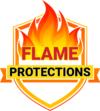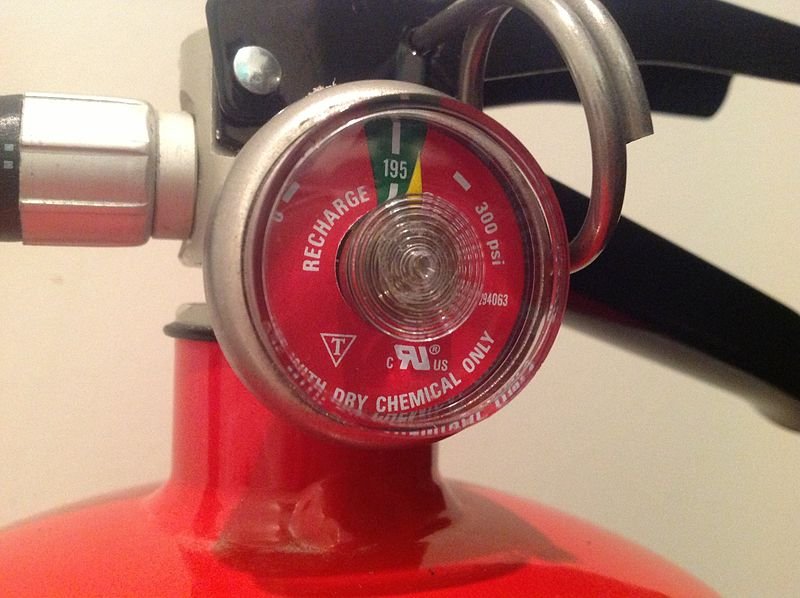Last Updated on September 16, 2024 by Abdullah Meraz
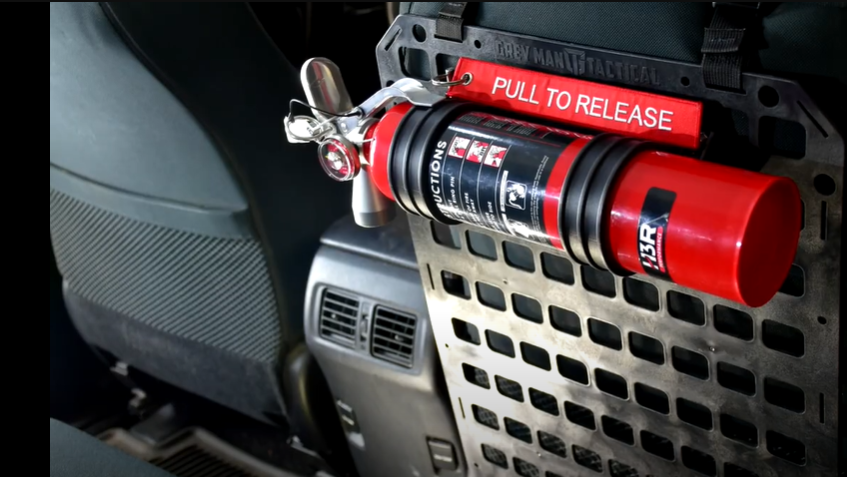
Safety on the road is about more than just wearing seat belts and following traffic laws; it is also involves being prepared for unexpected emergencies, such as car fires. To stand the first line of defense in a car fire, particularly a portable fire extinguisher, comes first.
Knowing enough about car fire safety; otherwise, it could harm more than reasonable. Selecting appropriate fire extinguisher in car is one of the main part in car fire safety. As the compliance department manager in an organization, I was heavily involved in import and export. Ensuring vehicle safety is paramount, particularly for trucks and cars.
In this article I wrote as maximum as I know regarding the fire extinguisher in car or other vehicles and I hope it will help you to understand.
- Why You Need a Fire Extinguisher in Car
- Types of Fire Extinguishers Suitable for Cars
- Understanding the Classes of Fire
- How to Choose the Right Car Fire Extinguisher
- Recommended Brands for Car and truck Use
- Suitable Installation and Placement
- Maintenance and Inspection
- Caravanning and Motorhome Fire Safety Tips
- Car Fire Extinguisher A Potential Life Saver
- FAQs
Why You Need a Fire Extinguisher in Car
A fire extinguisher in car or any kind of your vehicle is an accessory and vital security tool. Here are often numerous factors why every car must be equipped with a discharge extinguisher:
- Quick Action to Fires: Car fires may escalate quickly, usually within minutes. A discharge extinguisher allows you to react quickly, potentially preventing extreme damage to your automobile and traveler trauma.
- Security Against Popular Car Terminate Causes: Vehicle fires can be caused by several factors, such as electric malfunctions, energy leakages, engine overheating, or mishaps. A terminator extinguisher provides an initial line of protection against these circumstances, allowing you to contain or even extinguish a discharge before it spreads.
- Security for All Lorry Residents: Inside a discharge, the priority is always to leave the car securely. However, having a discharge extinguisher can also provide a means to control the discharge and prevent it from spreading to areas where passengers are trapped or unable to exit swiftly.
- Avoiding Ecological and Home Damages: Besides the immediate danger to daily life, truck fires risk the environment and neighboring property. An included fire can minimize the risk of spreading to additional automobiles or designs, decreasing ecological influence and also home reduction.
Real-life circumstances show the importance of having a fire extinguisher in car. For instance, expect a minor motor termination to be sensed early. Within that case, a motorist and a suitable discharge extinguisher can extinguish the fires before the fire hits the fuel storage tank or other flammable parts. In roadside mishaps, a fire extinguisher can also stop a terminate from igniting or spreading while hanging around for emergency responders.
Types of Fire Extinguishers Suitable for Cars
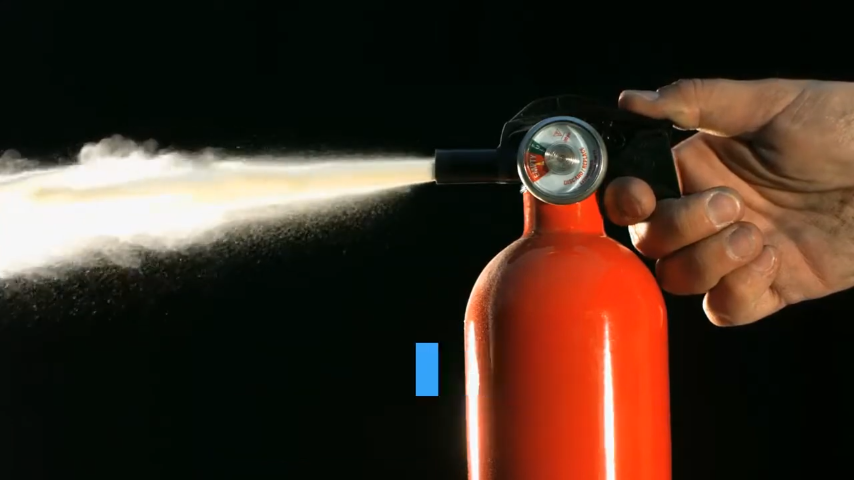
Several terminate extinguishers are available. However, not all are generally ideal for automobile utilization. When deciding to install a fire extinguisher in car and truck, it’s crucial to comprehend the various styles and also their suitability for detailed fire threats:
ABC Completely dry Chemical Extinguisher
These are multipurpose extinguishers that may take care of Class A (average combustibles), Class B (flammable fluids and gases), and Course C (electrical) fires. They are usually famous for vehicle use because they are often functional and successful, unlike most fires that can occur in a car. The completely dry chemical functions through disturbing the fire’s chemical response.
- Advantages: Flexible and practical against most automobile termination scenarios, widely available, and relatively economical.
- Downsides: It may leave of absence a harsh residue that may damage electric elements or the car’s internal.
BC Dry Chemical Extinguisher
These extinguishers were developed to handle Course B (flammable fluids and gases) and Class C (electrical) fires. Because of their performance against fuel and electrical fires, they are usually used in business cars and boats.
- Advantages: Specifically created for energy and electric fires, minimal cleanup was reviewed for ABC extinguishers.
- Downsides: They are, in fact, much less functional than ABC extinguishers, and they are generally improper for Course A fires.
CO2 (Carbon Dioxide) Extinguisher
CO2 extinguishers are generally ideal for Course B and C fires. They work by displacing oxygen, efficiently suffocating the fire. They do not leave any residue, making all of them suitable for power fires.
- Benefits: Absolutely no residue is actually near side responsible for, it is reliable for power and flammable liquid fires, and it is non-corrosive.
- Negative aspects: Limited range and discharge time, inadequate on Course A fires (combustible products).
Foam Extinguisher
These extinguishers are appropriate for Course A and B fires and work by developing a barrier between the energy and the air, efficiently smothering the fires.
- Advantages: Helpful on sound combustible and flammable liquid fires, protecting against re-ignition.
- Negative aspects: It is unsuitable for electric fires and also requires much more cleaning.
Understanding the Classes of Fire
Fires are classified into six categories based on the materials involved as fuels:
- Class A: Involves solid flammables like wood, paper, and textiles.
- Class B: Comprising flammable liquids such as gasoline and oil.
- Class C: Involves flammable gases like propane and methane.
- Class D: Involves combustible metals like magnesium and aluminum.
- Class E: (Informal): Involves electrical fires.
- Class F: Involves cooking oils and fats.
How to Choose the Right Car Fire Extinguisher
When picking a discharge extinguisher for your car, look at the following aspects:
- Size and Capacity: A portable extinguisher with an ability of 1 to 2.5 pounds is usually enough for automobiles. More significant automobiles, such as RVs or vehicles, may need many more gigantic extinguishers.
- Kind of Extinguisher: An ABC dry-out chemical extinguisher is the most flexible and widely recommended for automobiles because it handles all popular discharge types. However, if you focus on a cleanse representative for electrical fires, a CO2 extinguisher might be preferable.
- Certification and Specifications: Ensure that the discharge extinguisher meets the safety standards appropriately, such as those established by Underwriters Labs (UL) or other recognized security companies.
- Relieve of Use: The extinguisher should be simple to run and have to get rid of guidelines. Simpleness is critical in an emergency.
- Quality and Toughness: Choose a discharge extinguisher with a sturdy construction that can endure the vibrations and also temperature adjustments typical of a car or truck atmosphere.
Recommended Brands for Car and truck Use
Initially Inform Auto Discharge Extinguisher (FE10GR): A portable, lightweight, and functional ABC extinguisher perfect for automobile use. It possesses a placing brace for accessible storage space and fast access.
Kidde FX340GW: A budget-friendly, reliable ABC discharge extinguisher and a corrosion-resistant aluminum cylinder suitable for lorries.
H3R Execution HalGuard HG100C: A superior, clean, representative extinguisher that leaves zero residue, ideal for those who want to guard the interior of their lorry.
Suitable Installation and Placement
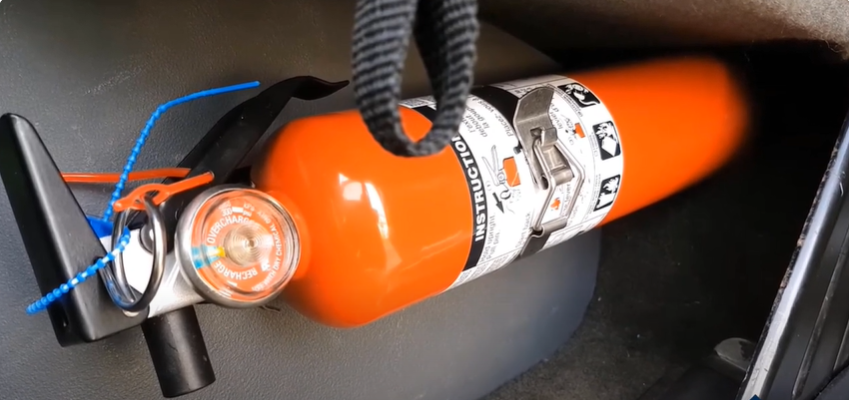
Mounting a fire extinguisher in car is about having one on hand and making it conveniently available in an emergency. Right here are some ideas for appropriate installation and positioning:
- Mounting Place: The discharge extinguisher must be mounted inside a protected and easily accessible location. Acquainted places include under the lorry vehicle driver or even the visitor seat, on the A-pillar, or inside the trunk (if rear accessibility is straightforward).
- Setting up Brackets: Utilize a long-lasting installing bracket for the extinguisher and vehicle production. Some extinguishers occur along with their brackets. However, aftermarket choices may deliver far, better protection.
- Presence and Accessibility: Ensure the extinguisher is visible and can be accessed promptly in an emergency. It must not be hidden under heavy items or stored in a hard-to-reach area.
- Secure Installing: Guarantee the fire extinguisher is safely and securely mounted to prevent it from becoming a projectile during an unexpected quit or collision.
Maintenance and Inspection
Regular upkeep and assessment are vital to guarantee your discharge extinguisher is prepared for use when needed. To have:
Month-to-month Evaluations: Inspect the extinguisher for indicators of harm, corrosion, or leaks. Ensure the stress-determined needle is in the environment-friendly zone, indicating the extinguisher is fully charged.
Check the Tamper Seal: Ensure the tamper seal is intact and has indeed not been busted. If it has, the extinguisher might have been actually utilized or even tampered with and needs to be examined by an expert.
Appeal for Bodily Damages: Check the extinguisher for dents, splits, or rust. Any physical harm could influence its execution within an emergency.
Shake the Extinguisher: Dry chemical extinguishers should be shlarly to prevent the powder
Caravanning and Motorhome Fire Safety Tips

A caravans and motorhomes are designed comprising many numerous amenities and technologies, that present unique fire hazards. To minimize the risk of fires, adhere to the following safety tips.
- Conduct a fire risk assessment.
- Install fire extinguishers according to NFPA-10 standards.
- Make sure regular inspection, servicing, and maintenance of fire extinguishers.
- Install smoke detectors and carbon monoxide detectors according to NFPA standards.
- Fire extinguishers should be placed away from heat sources and near exits.
- Types of Fires Vehicle Extinguishers Should Not Be Used On
- Vehicle extinguishers should not be used on flammable gases, combustible metals, or cooking oils and fats.
- If pets are with you, please consider them in fire safety measures and emergency preparedness.
- Make sure your appliances are maintained regularly to reduce CO gas emissions.
Car Fire Extinguisher A Potential Life Saver
A car fire extinguisher is an invaluable safety tool capable of preventing the rapid spread of fire. It is not guaranteed for safety while using appropriate fire extinguishers step-by-step that you and your passengers exit safely from the car and find refuge on the road. Though the likelihood of such situations is minimal. So being prepared for rare events like a car fire can be immensely beneficial.
